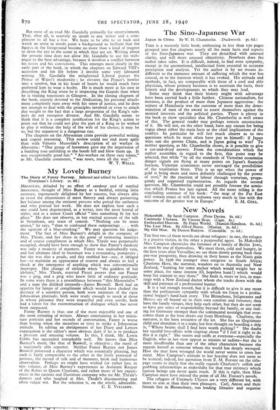The Sino-Japanese War
Japan in China. By W. H. Chamberlin. (Duckworth. 38. 6c1.) THIS is a masterly little book, embracing in less than 1so pages grouped into five chapters nearly all the main facts and aspects of the Sino-Japanese war. They are described with unusual clarity, and still more unusual objectivity. Nowhere does the author takes sides. It is difficult, indeed, to find even sympathy, except in the unemotional, intellectual form essential to accurate perception and analysis. Yet the author is by no means in- different to the immense amount of suffering which the war has caused, or to the heroism which it has evoked. His attitude and methods, in fact, are comparable with those of a cool and able physician, whose primary business is to ascertain the facts, their history and the developments to which they may lead.
Some may think that their history might with advantage have been carried back a little further. Chinese nationalism, for instance, is the product of more than Japanese aggression: the seizure of Manchuria was the outcome of more than the deter- mination of men of the sword to assert themselves against the monied interests and the political parties. There is plenty in the book to show specialists that Mr. Chamberlin is well aware of this. The general reader may perhaps remain unconscious of it. He will not, on the other hand, have any excuse for being vague about either the main facts or the chief implications of the conflict. In particular he will feel much clearer as to two questions which he must often have put to himself : if japan wins can she govern China, and is Japan going to win? To neither question, as Mr. Chamberlin shows, is it possible to give a cut-and-dried answer. From the considerations which the author assembles in regard to the first, this point may be selected, that while " by all the standards of Victorian economics danger signals are flying at many points on Japan's financial horizon, Victorian economists never envisaged the possibilities of the totalitarian State. This is an age when the power of gold is being more and more defiantly challenged by the power of steel," by the exaction of labour through terrorism, propa- ganda and organised regimentation. As regards the second question, Mr. Chamberlin could not possibly foresee the armis- tice which France has just signed. All the more telling is the concluding sentence of his book : " the map of the Far East will remain intact or will be redrawn very much in line with the
outcome of the greater war in Europe." E. M. Gum.


























 Previous page
Previous page